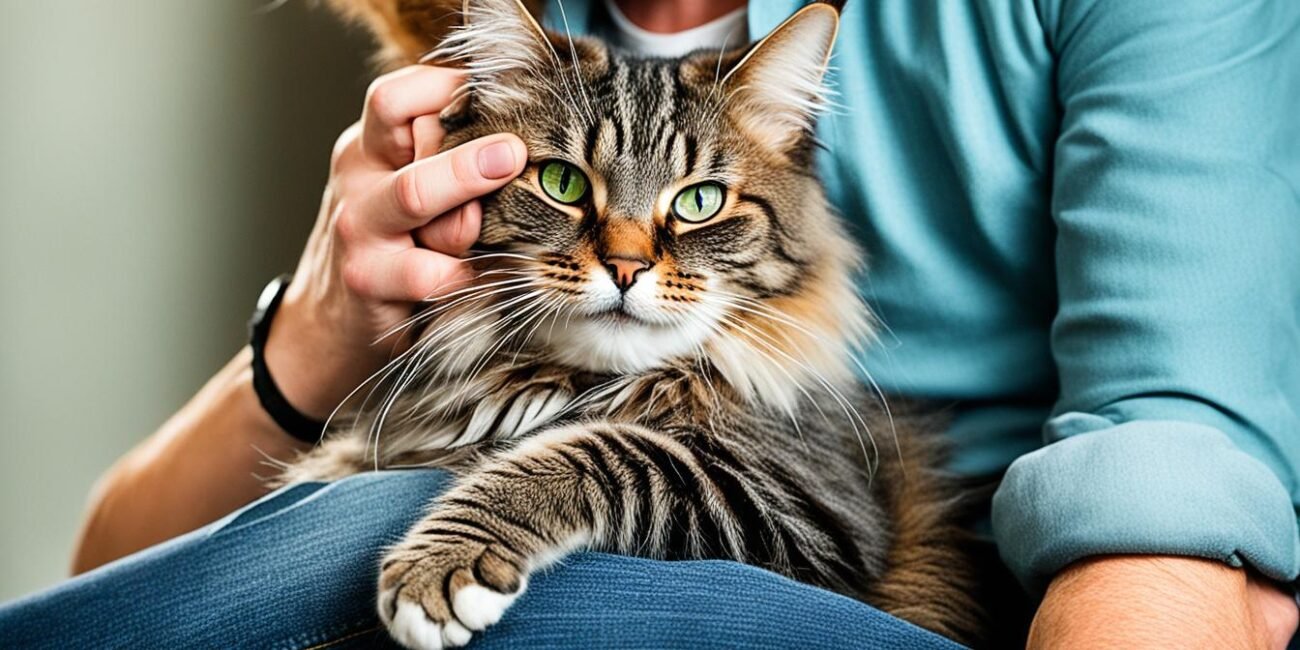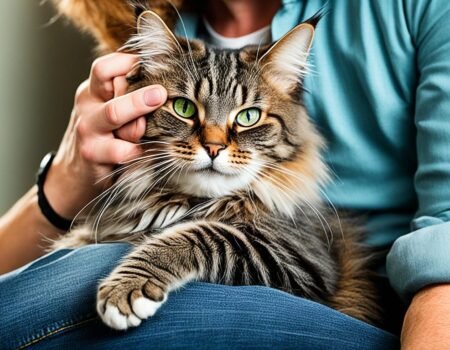“The smallest feline is a masterpiece.” – Leonardo da Vinci
As a cat owner, you may have wondered why your furry companion insists on rubbing against you, whether it’s your legs, face, or any available body part. This seemingly odd behavior can be both adorable and perplexing. But fear not, for your cat’s affectionate gestures are far from random – they hold deep meaning in the feline world.
Cats have unique ways of expressing their love and maintaining social connections. Head rubbing or bunting is one such behavior through which they communicate their affection. Understanding why your cat rubs against you is the first step in deciphering their mysterious language and strengthening the bond you share.
In this article, we will explore the fascinating world of feline affection and unravel the reasons behind your cat’s endearing rubbing behavior. So, let’s delve into the secrets of your cat’s heart and decode the language they use to express their love.
Key Takeaways:
- Cats rub against their owners as a way to show affection and maintain positive connections within their social group.
- Head rubbing, also known as bunting, is a common behavior in cats and is usually a sign of affection and bonding.
- When a cat rubs against you, it is a form of greeting and social interaction, expressing acceptance and a desire to create communal scent.
- Excessive or abnormal rubbing behavior may indicate an underlying health issue, and veterinary evaluation is recommended for proper diagnosis and treatment.
- Understanding your cat’s rubbing behavior can help strengthen the bond between you and your feline companion.
Why Does My Cat Rub Their Head Against Me?
Cats have a unique way of showing affection towards their owners – head rubbing. This behavior, also known as bunting or headbutting, is a common form of feline communication and bonding. When your cat rubs their head against you, it is a sign of love and a way for them to claim you as part of their social circle.
Head rubbing creates a sense of bonding between cats and their owners. It helps strengthen the positive relationship and deepens the connection. This gentle gesture not only shows affection but also establishes a sense of trust and security in your feline companion.
“A cat’s head rubbing behavior is a testament to their affection and desire to bond with their owners. It is a loving gesture that brings the cat and the owner closer.”
Through head rubbing, cats also leave their scent on you, marking you as part of their territory. Cats have scent glands on their heads, and when they rub against you, they are spreading their pheromones, signaling to other cats that you belong to them.
To better understand the significance of head rubbing, let’s take a look at a table that highlights some key aspects of this behavior:
| Aspect | Explanation |
|---|---|
| Affection | Head rubbing is a way for cats to show their love and affection towards their owners. |
| Bonding | Through head rubbing, cats establish a sense of bonding and trust with their owners. |
| Territorial Claim | By leaving their scent on you, cats mark you as part of their territory and social group. |
Understanding the significance of head rubbing can help you develop a stronger bond with your cat and appreciate their affectionate gestures. This behavior is a testament to the special connection between cats and their human companions.
What Does It Mean When a Cat Rubs Against You?
When a cat rubs against you, it is usually a sign of greeting and social interaction. Cats have scent glands on their heads, cheeks, and tails, and when they rub against humans or other animals, they are leaving their unique scent as a way of marking territory and establishing bonds. This behavior is a form of communication and a way for cats to express their feelings towards their owners. It signals acceptance, affection, and a desire to create a communal scent within the group. Rubbing against you is a way for your cat to say “hello” and show that they are happy to see you.
“Rubbing against you is a way for your cat to say ‘hello’ and show that they are happy to see you.”
Why Does My Cat Rub Against Things All the Time?
Excessive Rubbing Behavior and Cat Health Problems
In general, rubbing behavior in cats is normal and not indicative of a health problem. Cats often rub against objects as a way to mark their territory or gather information about their environment. However, if your cat is rubbing against things excessively or if the behavior is out of character for them, it could be a sign of an underlying medical issue.
There are several cat health problems that can cause excessive rubbing behavior. Allergies, such as food or environmental allergies, can lead to skin irritation and itching, triggering cats to rub against objects in an attempt to alleviate the discomfort. Fleas and ticks can also cause intense itching, leading to excessive rubbing and scratching.
Ear infections are another potential cause of excessive rubbing behavior. Ear mites or bacterial/fungal infections can cause discomfort in the ears, prompting cats to rub their heads against objects to relieve the itching or pain. Additionally, certain skin conditions, such as dermatitis or allergic reactions, can cause cats to experience heightened sensitivity or irritation, leading to excessive rubbing.
If you notice any other potential signs of illness or injury, along with the excessive rubbing behavior, it is recommended to consult a veterinarian for further evaluation. Other symptoms to watch out for include changes in appetite, lethargy, hair loss, redness or inflammation of the skin, and the presence of bumps, sores, or lesions.
By seeking veterinary advice, you can ensure that any underlying health issues are addressed and provide appropriate treatment for your cat, alleviating their discomfort and promoting overall well-being.
Understanding Excessive Rubbing Behavior in Cats
Excessive rubbing behavior in cats could be a sign of underlying health issues such as allergies, fleas or ticks, ear infections, or skin conditions.
When to Seek Veterinary Advice
- Excessive rubbing behavior that is out of character for your cat
- Presence of other potential signs of illness or injury
- Changes in appetite, lethargy, or hair loss
- Redness, inflammation, or presence of bumps/lesions on the skin
How Do You Get a Cat to Stop Rubbing Against You?
If the rubbing behavior bothers you, there are ways to redirect your cat’s attention. You can try using a lure toy or tossing treats away from them to distract them from rubbing against you. It is important to remember that rubbing against their owners is a natural behavior for cats and is often a way for them to express affection. However, if you want to discourage the behavior, it is important to find alternative ways to bond with your cat, such as playing fetch or engaging in interactive play sessions.
Cat training can also be effective in redirecting their behavior. By teaching them simple commands like “sit” or “stay,” you can redirect their attention to more desirable behaviors. Positive reinforcement, such as treats and praise, can motivate them to learn and obey your commands. Patience and consistency are key in cat training, as it may take time for your cat to understand and respond to your cues.
Creating a designated space for your cat, such as a scratching post or a designated area with toys, can also help redirect their rubbing behavior. Providing them with an alternative outlet for their natural instincts can help satisfy their needs and reduce their desire to rub against you.
It is important to note that punishment or scolding should never be used to discourage rubbing behavior. Cats do not respond well to negative reinforcement, and it may lead to fear or anxiety.
Remember, redirecting your cat’s behavior requires patience, consistency, and positive reinforcement. By providing alternative outlets for their natural instincts and using positive training techniques, you can help curb excessive rubbing and strengthen your bond with your feline companion.
| Redirecting Cat Behavior: Tips to Discourage Rubbing |
|---|
| Use a lure toy or treats to distract your cat |
| Engage in interactive play sessions and games |
| Train your cat with simple commands and positive reinforcement |
| Create a designated space with toys and scratching posts |
| Avoid punishment or scolding |
Cat Rubbing as a Form of Territory Marking
Cats have scent glands on their heads, cheeks, and tails, which they use to mark their territory. When a cat rubs against their owner, they are leaving their unique scent as a way of claiming them as part of their social group and marking them as their own. This behavior helps create a sense of familiarity, establishes boundaries, and reinforces group scent within the cat colony. Rubbing against their owners is a way for cats to communicate their ownership and establish a sense of belonging.
By rubbing their scent on their owners, cats effectively mark them as territorial possessions, reinforcing their social bond and identifying them as a member of their group. This behavior is not only a form of communication but also a way for cats to establish a safe and secure environment within their surroundings.
In addition to rubbing against their owners, cats may also engage in other territorial marking behaviors, such as scratching furniture or spraying urine. These behaviors serve the same purpose: to claim and mark their territory with their unique scent. Cats have a strong instinct to establish and maintain their territory, and rubbing is just one of the ways they fulfill this innate need.
| Benefits of Cat Rubbing as Territory Marking | Explanation |
|---|---|
| Establishes ownership | Rubbing allows cats to declare their ownership of their owners and create a sense of belonging. |
| Creates familiarity | By leaving their scent on their owners, cats create a familiar and comforting environment for themselves. |
| Defines boundaries | Through rubbing, cats define and establish their personal boundaries within their social group. |
| Reinforces group scent | By rubbing against their owners, cats contribute to the overall scent profile of their social group, reinforcing a collective identity. |
Understanding and acknowledging cat rubbing as a form of territory marking is important for cat owners. It allows us to appreciate and respect their natural instincts and helps foster a stronger bond with our feline companions.
Rubbing for Information Gathering
Cats have a unique way of gathering information through their rubbing behavior. When cats rub their heads against new humans or other animals, they are actually using their sense of smell to learn about the scent of the unfamiliar individual. This rubbing behavior allows cats to obtain important scent cues and assess the presence of potential threats or affiliations with other animals.
It’s important to understand that when a cat rubs against someone, it doesn’t necessarily mean that they want to be touched or petted. It is simply a form of information gathering. Cats use their heightened sense of smell to gather information about their surroundings and the individuals they encounter.
The Power of Scent
The sense of smell plays a crucial role in a cat’s life and is key to their communication and understanding of the world. Cats have scent glands on various parts of their body, including their heads, cheeks, and tails. When they rub against objects or individuals, they leave behind their unique scent as a way of marking territory and establishing social connections.
“Rubbing against someone is a cat’s way of collecting information about their surroundings and the individuals they encounter.”
Through this rubbing behavior, cats can gather information about their environment, including the presence of potential threats or the familiarity of other animals. It’s their way of understanding and navigating their surroundings through scent cues.
The Importance of Understanding Cat Body Language
Cat body language can be subtle yet meaningful. By paying attention to their rubbing behavior, you can gain valuable insights into their current state of communication and emotions. Rubbing is just one of the many ways cats express themselves non-verbally.
Understanding cat body language can help you interpret their needs, emotions, and boundaries. By observing the context and other accompanying behaviors, you can gain a deeper understanding of what your cat is trying to communicate.
Remember to respect your cat’s personal space and boundaries when they engage in rubbing behavior. Allow them to gather the information they need without feeling pressured or overwhelmed.
Cat Rubbing for Bonding and Acceptance
Cats use rubbing behavior as a way to bond with their owners and other cats. When a cat rubs their head against their owner, it is a sign of acceptance and affection. This behavior is learned from their mothers, who teach them that head rubbing is a form of bonding and a way to establish positive relationships. By rubbing their heads against their owners, cats release friendly pheromones and mark them as safe and welcoming. It is a way for cats to show trust and create a deeper connection with their human companions.
| Benefits of Cat Rubbing for Bonding and Acceptance |
|---|
| 1. Strengthening the bond between cats and their owners. |
| 2. Establishing positive relationships within the social group. |
| 3. Creating a sense of trust and security. |
| 4. Releasing friendly pheromones to mark individuals as safe and welcoming. |
When cats rub against each other, it is a form of social interaction and a way to strengthen their bond. By rubbing their heads together, they exchange scents and create a communal scent that contributes to group cohesion. This behavior is an essential part of feline communication and plays a significant role in maintaining harmonious relationships within a cat colony.
Cats Rubbing to Communicate Need
Cats have a unique way of communicating their needs to their owners – rubbing. Whether it’s against objects or their owners themselves, this behavior serves as a clear message that they require attention, hunger satisfaction, or even an alert for potential problems. Understanding your cat’s rubbing behavior is essential for providing appropriate care and support for your feline companion.
When Should You Worry About Excessive Rubbing?
Excessive rubbing behavior in cats can be a sign of underlying health issues. If your cat is constantly rubbing against objects or themselves, and if this behavior is accompanied by other changes in attitude or behavior, it is recommended to seek veterinary advice. Cats may rub excessively due to allergies, fleas, ear infections, or other medical conditions. Monitoring your cat’s behavior and seeking veterinary evaluation can help identify any potential health problems and ensure appropriate treatment.
Excessive rubbing in cats can be a cause for concern, as it may indicate an underlying health problem. If your cat’s rubbing behavior is persistent and accompanied by other changes in their behavior or attitude, it is important to consult with a veterinarian to determine the cause and appropriate course of action. Some common health issues that can result in excessive rubbing include:
- Allergies: Cats can be allergic to certain foods, environmental triggers (such as pollen or dust mites), or even certain grooming products. Allergies can cause itching and discomfort, leading to excessive rubbing.
- Fleas or ticks: Infestations of fleas or ticks can cause intense itching, resulting in excessive rubbing and scratching.
- Ear infections: Infections in the ears can cause discomfort and itching, leading to excessive rubbing of the head and ears.
- Skin conditions: Cats can develop various skin conditions, such as dermatitis or eczema, which can cause itching and lead to excessive rubbing.
It is important to closely monitor your cat’s behavior and seek veterinary evaluation if you notice any changes in their rubbing behavior or overall well-being. Proper diagnosis and treatment can help alleviate any discomfort and ensure your cat’s health and well-being.
| Signs It’s Time to Seek Veterinary Advice for Excessive Rubbing: |
|---|
| 1. Excessive and persistent rubbing against objects or themselves. |
| 2. Accompanied by other changes in behavior or attitude. |
| 3. Visible signs of discomfort or distress. |
| 4. Presence of other symptoms, such as hair loss, redness, or sores. |
| 5. History of allergies, fleas, or other skin issues. |
Conclusion
Rubbing behavior in cats is a natural and instinctive way for them to demonstrate affection, establish territory, and communicate with their owners and fellow felines. Through this behavior, cats express their love and strengthen their social bonds within their social group.
While cat rubbing behavior is generally harmless and indicative of positive emotions, it is important to monitor for any excessive or abnormal rubbing. In such cases, it is advisable to consult with a veterinarian to assess for potential underlying health issues.
Understanding and appreciating your cat’s rubbing behavior can enhance the connection between you and your feline companion. By recognizing this form of feline communication and responding with affection and care, you can build a stronger and more fulfilling relationship with your cat.
FAQ
Why does my cat rub their head against me?
Cats rub their heads against their owners as a way to show affection and maintain positive connections within their social group. Head rubbing, also known as bunting or headbutting, is a common behavior in cats and is usually a sign of affection. It is their unique way of showing love and claiming their owners as part of their social circle.
What does it mean when a cat rubs against you?
When a cat rubs against you, it is usually a sign of greeting and social interaction. Cats have scent glands on their heads, cheeks, and tails, and when they rub against humans or other animals, they are leaving their unique scent as a way of marking territory and establishing bonds. Rubbing against you is a way for your cat to say “hello” and show that they are happy to see you.
Why does my cat rub against things all the time?
Cats sometimes rub against things excessively as a way of marking territory, gathering information, or communicating their needs. While rubbing behavior is generally not a cause for concern, excessive or abnormal rubbing can be a sign of underlying health issues. If you notice any other potential signs of illness or injury along with the excessive rubbing, it is recommended to consult a veterinarian for further evaluation.
How do you get a cat to stop rubbing against you?
If the rubbing behavior bothers you, there are ways to redirect your cat’s attention. You can try using a lure toy or tossing treats away from them to distract them from rubbing against you. It is important to remember that rubbing against their owners is a natural behavior for cats and is often a way for them to express affection. However, if you want to discourage the behavior, it is important to find alternative ways to bond with your cat, such as playing fetch or engaging in interactive play sessions.
Why do cats rub against things to mark territory?
Cats have scent glands on their heads, cheeks, and tails, which they use to mark their territory. When a cat rubs against objects or their owners, they are leaving their unique scent as a way of claiming them as part of their social group and marking them as their own. This behavior helps create a sense of familiarity, establishes boundaries, and reinforces group scent within the cat colony.
Why do cats rub their heads against new humans or other animals?
Cats sometimes rub their heads against new humans or other animals as a way of gathering information. By rubbing their heads, they can obtain important scent cues and learn about the scent of the unfamiliar individual. This behavior helps cats assess the presence of potential threats or determine if the new individual has any association with other animals. Rubbing against someone does not necessarily mean that a cat wants to be touched or petted; it is simply a form of information gathering.
Why do cats rub against their owners for bonding and acceptance?
Cats use rubbing behavior as a way to bond with their owners and other cats. When a cat rubs their head against their owner, it is a sign of acceptance and affection. This behavior is learned from their mothers, who teach them that head rubbing is a form of bonding and a way to establish positive relationships. By rubbing their heads against their owners, cats release friendly pheromones and mark them as safe and welcoming. It is a way for cats to show trust and create a deeper connection with their human companions.
Do cats rub against their owners to communicate their needs?
Cats often use rubbing behavior as a way to communicate their needs to their owners. By rubbing against objects or their owners, cats can indicate hunger, the need for attention, or even alert their owners to potential problems. It is important for cat owners to pay attention to their cats’ rubbing behavior and to learn their individual behavioral cues. By understanding their cats’ body language and responding to their needs, owners can provide the appropriate care and support for their feline companions.
When should you worry about excessive rubbing behavior in cats?
Excessive rubbing behavior in cats can be a sign of underlying health issues. If your cat is constantly rubbing against objects or themselves, and if this behavior is accompanied by other changes in attitude or behavior, it is recommended to seek veterinary advice. Cats may rub excessively due to allergies, fleas, ear infections, or other medical conditions. Monitoring your cat’s behavior and seeking veterinary evaluation can help identify any potential health problems and ensure appropriate treatment.








No Comment! Be the first one.